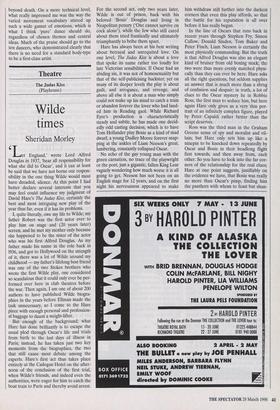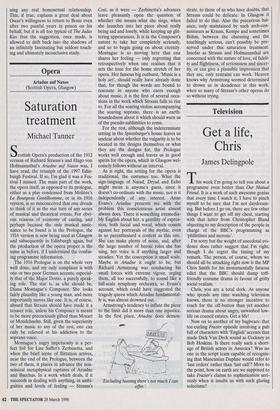Theatre
The Judas Kiss
(Playhouse)
Wilde times
Sheridan Morley
Let England,' wrote Lord Alfred Douglas in 1937, 'bear all responsibility for what she did to Oscar', and it can at least be said that we have not borne our respon- sibility in the one thing Wilde would most have dreaded, silence. At this point I had better declare several interests that you may feel could influence my judgment of David Hare's The Judas Kiss, certainly the best and most intriguing new play of the year thus far, even if it has its problems.
I, quite literally, owe my life to Wilde; my father Robert was the first actor ever to play him on stage and (20 years later) screen, and he met my mother only because she happened to be the sister of the actor who was his first Alfred Douglas. As my father made his name in the role back in 1936, and got to Hollywood on the strength of it, there was a lot of Wilde around my childhood — my father's lifelong best friend was one of the two Stokes brothers who wrote the first Wilde play, one considered so scandalous that it could only ever be per- formed over here in club theatres before the war. Then again, I am one of about 200 authors to have published Wilde biogra- phies in the years before Ellman made the task unnecessary, so I come to the Hare piece with enough personal and profession- al baggage to daunt a weight-lifter.
But enough of the background; what Hare has done brilliantly is to escape the usual plod through Oscar's life and trials from birth to the last days of illness in Paris; instead, he has taken just two key moments from the biographies, the two that still cause most debate among the experts. Hare's first act thus takes place entirely at the Cadogan Hotel on the after- noon of the conclusion of the first trial, when Wilde's friends, and indeed even the authorities, were eager for him to catch the boat train to Paris and thereby avoid arrest. For the second act, only two years later, Wilde is out of prison, back with his beloved `Bosie' Douglas and living in Neapolitan penury (`One cannot survive on cock alone'), while the few who still cared about them tried frantically and ultimately triumphantly to bribe them apart.
Hare has always been at his best writing about betrayal and unrequited love. On one level, The Judas Kiss is about a love that spoke its name rather too loudly for late Victorian sensibilities. If Oscar had an abiding sin, it was not of homosexuality but that of the self-publicising huckster; yet on many of its deeper levels the play is about guilt, and arrogance, and revenge, and above all else it is about a man who simply could not make up his mind to catch a train or abandon forever the lover who had land- ed him in Reading gaol. While Richard Eyre's production is characteristically steady and subtle, he has made one decid- edly odd casting decision, which is to have Tom Hollander play Bosie as a kind of mad dwarf, a young Dudley Moore forever snap- ping at the ankles of Liam Neeson's great, lumbering, constantly collapsed Oscar.
No echo of the gay young man with the green carnation, no trace of the playwright or the poet, just a gigantic, fallen King Lear vaguely wondering how much worse it is all going to get. Neeson has not been on an English stage for 12 years, and on the first night his nervousness appeared to make him withdraw still further into the darkest corners that even this play affords, so that the battle for his reputation is all over before it has really begun.
In the line of Oscars that runs back in recent years through Stephen Fry, Simon Callow, Donald Sinden, Tom Baker and Peter Finch, Liam Neeson is certainly the most physically commanding. But the truth is that Alfred Douglas was also an elegant kind of bruiser from old boxing stock; the two were thus more evenly matched physi- cally than they can ever be here. Hare asks all the right questions, but seldom supplies an answer that is much more than a shrug of confusion and despair; in truth, a lot of clues to the Oscar mystery lie in Robbie Ross, the first man to seduce him, but here again Hare only gives us a very thin por- trait of an infinitely complex figure, played by Peter Capaldi rather better than the script deserves.
Ross was the third man in the Graham Greene sense of spy and moralist and vil- lain; but Hare only sets him up like a ninepin to be knocked down repeatedly by Oscar and Bosie in their headlong flight first towards, and then away from, each other. So you have to look into the far cor- ners of the relationship for the real clues; Hare at one point suggests, justifiably on the evidence we have, that Bosie was really no more than Oscar's pimp, finding him the panthers with whom to feast but shun- ning any real homosexual relationship. This, if true, explains a great deal about Oscar's willingness to return to Bosie even after two painful years in prison on his behalf, but it is all too typical of The Judas Kiss that the suggestion, once made, is allowed to drift back into the shadows of an infinitely fascinating but seldom touch- ing and ultimately inconclusive study.























































 Previous page
Previous page